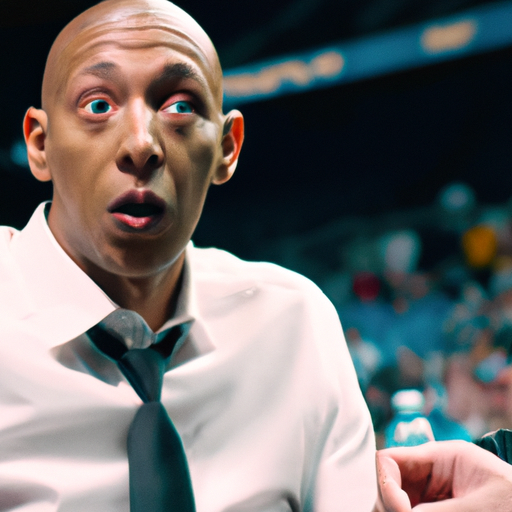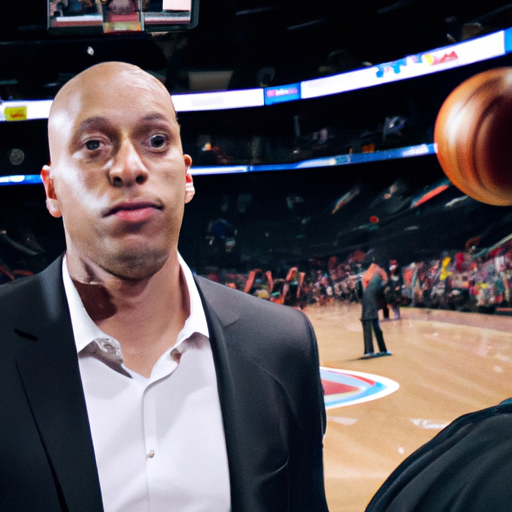Heat’s Caron Butler details priceless experience of being an assistant coach

The Role and Responsibilities of an Assistant Coach in the NBA
The role of an assistant coach in the NBA is often overlooked, but it is an essential position that plays a crucial role in the success of a team. Caron Butler, a former NBA player who is now an assistant coach for the Miami Heat, recently shared his experience and shed light on the responsibilities and challenges that come with this role.
One of the primary responsibilities of an assistant coach is to support the head coach in various aspects of the game. This includes helping with game planning, scouting opponents, and developing strategies to exploit weaknesses and maximize the team’s strengths. Assistant coaches spend countless hours studying game footage, analyzing statistics, and brainstorming ideas to give their team a competitive edge.
In addition to the strategic aspect of the job, assistant coaches also play a crucial role in player development. They work closely with individual players, helping them improve their skills, refine their techniques, and develop their basketball IQ. This involves conducting individual training sessions, providing feedback and guidance, and offering support and encouragement to help players reach their full potential.
Caron Butler emphasized the importance of building strong relationships with the players. He believes that trust and open communication are key to creating a positive and productive environment. Assistant coaches often act as a bridge between the players and the head coach, relaying messages, addressing concerns, and providing a supportive ear for players to express their thoughts and feelings.
Another significant responsibility of an assistant coach is to provide in-game support. They sit on the sidelines, closely observing the game, and offering insights and suggestions to the head coach. This requires a deep understanding of the game, quick thinking, and the ability to make split-second decisions. Assistant coaches must be able to adapt to changing circumstances and provide valuable input to help the team make the right decisions on the court.
Caron Butler also highlighted the challenges that come with being an assistant coach. One of the biggest challenges is the lack of control. Assistant coaches often have to put their own ambitions and desires aside and focus solely on the team’s success. They must be willing to accept a supporting role and make sacrifices for the greater good of the team.
Furthermore, the demanding schedule of an NBA assistant coach can be physically and mentally exhausting. They travel extensively, often spending long hours away from home and their families. They must be able to handle the pressure and stress that comes with the job, while maintaining a positive and professional demeanor.
Despite the challenges, Caron Butler described his experience as an assistant coach as priceless. He emphasized the satisfaction that comes from seeing the players grow and succeed, and the joy of being part of a winning team. He believes that being an assistant coach is not just a job, but a calling, and that the impact they have on the players and the team is immeasurable.
In conclusion, the role of an assistant coach in the NBA is multifaceted and demanding. They play a vital role in supporting the head coach, developing players, providing in-game support, and maintaining a positive team environment. While the job comes with its challenges, the rewards are immeasurable. Caron Butler’s experience as an assistant coach highlights the importance and value of this role in the NBA.
Insights into Caron Butler’s Transition from Player to Assistant Coach

Caron Butler, a former NBA player known for his toughness and versatility on the court, has recently made the transition from player to assistant coach. In a recent interview, Butler shared his insights and experiences in this new role, highlighting the valuable lessons he has learned along the way.
One of the first things Butler emphasized was the importance of communication as an assistant coach. He explained that being able to effectively communicate with both players and the head coach is crucial for success. As a player, Butler was used to receiving instructions and feedback from coaches, but now he finds himself on the other side, responsible for delivering those messages. He stressed the need to find the right balance between being assertive and understanding, as each player has different personalities and responds differently to feedback.
Butler also discussed the challenges he faced in transitioning from player to coach. He admitted that it was not an easy process, as he had to shift his mindset from being solely focused on his own performance to now being responsible for the development and success of an entire team. He had to learn to let go of his ego and embrace a more selfless approach to the game. This transition required a great deal of humility and a willingness to learn from others, including the head coach and fellow assistant coaches.
One of the most valuable lessons Butler has learned as an assistant coach is the importance of preparation. He stressed the need to be well-prepared for every practice, game, and scouting report. He explained that as a player, he often relied on his natural talent and instincts, but as a coach, he has come to understand the value of meticulous planning and attention to detail. He emphasized the need to study opponents’ tendencies, analyze game footage, and develop game plans that maximize the team’s strengths and exploit the weaknesses of their opponents.
Butler also touched on the unique perspective he now has as a coach. He explained that being on the sidelines allows him to see the game from a different vantage point, enabling him to identify patterns and make strategic adjustments in real-time. He described this newfound perspective as a “priceless experience” that has deepened his understanding of the game and enhanced his ability to contribute to the team’s success.
In addition to the technical aspects of coaching, Butler also highlighted the importance of building relationships with players. He stressed the need to establish trust and open lines of communication, as this is crucial for creating a positive and cohesive team environment. He explained that his experience as a player has helped him relate to the challenges and pressures that players face, allowing him to connect with them on a deeper level.
As the interview came to a close, Butler expressed his gratitude for the opportunity to be an assistant coach. He acknowledged that the transition from player to coach has been a challenging but rewarding journey. He emphasized the importance of continuous learning and growth, as he strives to become the best coach he can be.
In conclusion, Caron Butler’s insights into his transition from player to assistant coach provide valuable lessons for anyone considering a similar career path. From the importance of communication and preparation to the unique perspective and relationships that come with coaching, Butler’s experiences shed light on the multifaceted role of an assistant coach. As he continues to grow and learn in this new role, Butler’s journey serves as an inspiration for aspiring coaches everywhere.
The Value of Mentorship and Learning from Experienced Coaches in the NBA
The NBA is a league filled with talented players, but it is also a league that values the knowledge and experience of its coaches. Caron Butler, a former NBA player who is now an assistant coach for the Miami Heat, understands the value of mentorship and learning from experienced coaches in the NBA. In a recent interview, Butler detailed his priceless experience of being an assistant coach and how it has shaped his understanding of the game.
One of the key aspects of being an assistant coach is the opportunity to learn from experienced coaches. Butler explains that being able to work alongside head coach Erik Spoelstra and his staff has been invaluable. He has been able to observe their coaching techniques, strategies, and decision-making processes up close. This firsthand experience has allowed him to gain a deeper understanding of the game and how to effectively coach players.
Butler also emphasizes the importance of mentorship in his role as an assistant coach. He believes that having a mentor is crucial for personal and professional growth. In his case, Spoelstra has been a mentor figure who has guided him throughout his coaching journey. Butler describes Spoelstra as someone who is always willing to share his knowledge and provide guidance. This mentorship has not only helped Butler become a better coach but has also shaped his approach to mentoring players.
As an assistant coach, Butler has had the opportunity to work closely with players and help them develop their skills. He believes that mentorship is a two-way street, where both the coach and the player can learn from each other. Butler explains that being able to connect with players on a personal level is essential in building trust and rapport. By understanding their strengths, weaknesses, and aspirations, he can tailor his coaching approach to meet their individual needs.
One of the most rewarding aspects of being an assistant coach for Butler is seeing the growth and development of players under his guidance. He takes pride in being able to contribute to their success and help them reach their full potential. Butler believes that coaching is not just about X’s and O’s, but also about building relationships and instilling confidence in players.
In addition to working with players, Butler also values the opportunity to collaborate with other coaches. He believes that the best ideas and strategies come from open discussions and brainstorming sessions. By bouncing ideas off each other and challenging each other’s perspectives, coaches can come up with innovative approaches to the game.
Butler’s experience as an assistant coach has taught him the importance of continuous learning and growth. He understands that the NBA is a constantly evolving league, and coaches must adapt to new trends and strategies. By staying curious and seeking out new knowledge, Butler believes that he can continue to be an effective coach and mentor.
In conclusion, Caron Butler’s experience as an assistant coach for the Miami Heat has been priceless. Through mentorship and learning from experienced coaches, he has gained a deeper understanding of the game and how to effectively coach players. He emphasizes the importance of building relationships with players and collaborating with other coaches. Butler’s journey as an assistant coach has taught him the value of continuous learning and growth in the ever-changing world of the NBA.

